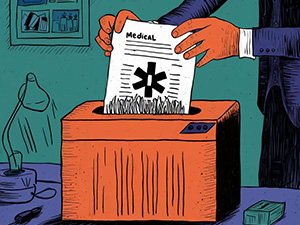
Health insurance is designed to provide access to necessary treatments, preventive services and emergency care to individuals and families in need, and, apparently, now it’s also used to hand out paydays to scammers.
In February of this year, Change Healthcare fell victim to a cyber-attack that impacted thousands of health care providers, insurers and policyholders nationwide. Reports from this incident suggest that around 50% of all US medical claims could be at risk! To put that into perspective, if you’re in the waiting room with nine other people, there’s a good chance that five of you could fall victim to medical identity theft within the year. The aftermath of this fraud is staggering, affecting countless individuals and their access to health care. Once your medical information is exposed online, these identity thieves can use it to file false claims, buy expensive prescriptions and more, and it will all be conveniently billed to your account.
The worst part is how some people are finding out they were affected. Some are facing tax or mortgage fraud, but others are going to the doctor to find out if they need a procedure, but instead of getting a surgery date, they’re handed a rejection letter from their insurance provider, claiming the company won’t cover it because they’ve exhausted their benefits from multiple other procedures this year. But the thing is, THEY didn’t have any other procedures this year. Someone stole their medical ID and used it for their own procedures.
And it’s not just individuals you have to worry about. Manipulative organizations can use your medical information for fake billing schemes. What happens is that they submit false claims for medical services you never requested, received or knew anything about, then they collect their payday, and stick you with the bill. In July, 193 defendants, including 76 doctors, nurse practitioners and other licensed medical professionals, were charged for their alleged participation in several different health care fraud schemes that resulted in $2.75 billion in false billings to federal programs. Medical fraud happens!
How Do You Know If You’re A Victim?
Here are 10 signs that your medical ID may have been stolen and is currently being used by cybercriminals:
- Unexpected Medical Bills: Receiving bills for medical services you didn’t receive is a major red flag.
- Collection Notices: Being contacted by debt collectors for unpaid medical bills that aren’t yours.
- Errors In Medical Records: Finding inaccuracies in your medical records, such as treatments you never had, incorrect diagnoses or unfamiliar medical histories.
- Insurance Issues: Your health insurance claims are denied because your benefits have been maxed out or you’re told you’ve reached your coverage limit, despite not using the services.
- Notification From Your Insurance Provider: Receiving alerts from your health insurance provider about claims or services you don’t recognize.
- Unknown Accounts: Discovering new health insurance accounts or medical records under your name that you didn’t create.
- Discrepancies In Your Explanation Of Benefits (EOB): Your EOB statements from your insurer list medical services you didn’t receive.
- Being Denied Insurance: Having difficulty obtaining life or health insurance because medical conditions that you don’t have are listed in your records.
- Calls From Medical Providers: Receiving calls from doctors or medical facilities about appointments or follow-ups for treatments you never had.
- Unfamiliar Prescriptions: Notices about prescriptions being filled in your name that you did not authorize or receive.
How Can You Prevent Becoming A Victim Of Medical ID Fraud?
Don’t become the next medical ID theft victim. Here are a few steps you can take to protect yourself:
- Check For Health Care Breaches: Use a searchable database, like this one, to find out if your health care information has been compromised.
- Secure Your Records: Store paper copies of medical records in a safe or lockbox to prevent unauthorized access. If your health care organization’s system is compromised and records are lost, altered or unable to be accessed, you will be glad you did this.
- Shred Documents: Shred any documents with personal information before disposing of them.
- Monitor Your Medical Records: Regularly request and review your medical records from your health care providers and look for unfamiliar treatments, diagnoses or other discrepancies.
- Review Insurance Bills: Carefully review explanation of benefits (EOB) statements from your insurance provider for any services you did not receive and question unfamiliar or unclear charges. Contact your insurer immediately if you see any charges or services that you don’t recognize. Afterward, report any billing errors to the credit bureaus at IdentityTheft.gov.
- Dispose Of Prescription Labels: Remove labels from empty prescription bottles before discarding them! These labels can contain information that, believe it or not, can be used to steal your identity.
- Monitor Your Credit: At AnnualCreditReport.com, you are able to get three free reports a year to keep an eye on any suspicious activity.
Health care will always be around and will also always be a target for hackers. Attacks on hospitals, doctors’ offices and other medical facilities will continue. It’s important that you are taking proactive measures to protect yourself. We can help you find out how you’re at risk with our FREE Dark Web Scan. Using this technology, we can quickly find out if your information has been put up for sale on the dark web or if you’ve been a victim of a data breach. To book your Dark Web Scan, call us at 864-288-1114 or click here.



